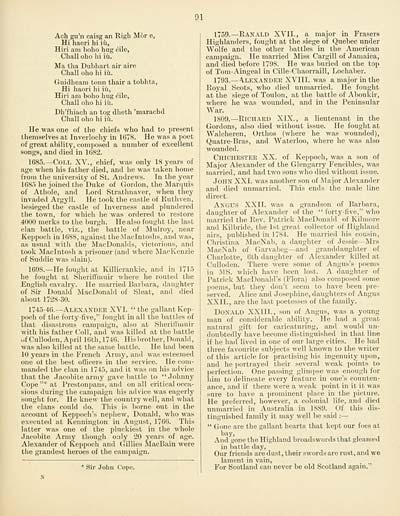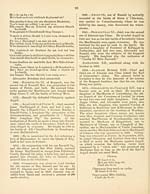Download files
Complete book:
Individual page:
Thumbnail gallery: Grid view | List view

Ach gu'n caisg an Righ Mor e,
Hi haori hi iù,
Hiri am boho hug eile,
Chall oho hi iù.
Ma tha Dubhart air aire
Chall oho hi iù.
Giiidheam tonn thair a tobhta,
Hi haori hi iii,
Hiri am boho hug eile,
Chall oho hi iii.
Dh'fhiach an tog dheth 'marachd
Chall oho hi iù.
He was one of the chiefs who had to present
themselves at Inverlochy in 1678. He was a poet
of great ability, composed a number of excellent
songs, and died in 1682.
1685.— Coll XV., chief, was only 18 years of
age when his father died, and he was taken home
from the university of St. Andrews. In the year
1685 he joined the Duke of Gordon, the Marquis
of Athole, and Lord Strathnaver, when they
invaded Argyll. He took the castle of Kuthven,
besieged the castle of Inverness and plundered
the town, for which he was ordered to restore
4000 merks to the burgh. He also fought the last
clan battle, viz., the battle of Mulroy, near
Keppoch in 1688, against theMacIntoshs, and was,
as usual with the MacDonalds, victorious, and
took Macintosh a prisoner (and where MacKenzie
of Suddie was slain).
1698.— He fought at Killicrankie, and in 1715
he fought at Sheriffmuir where he routed the
English cavalry. He married Barbara, daughter
of Sir Donald MacDonald of Sleat, and died
about 1728-30.
1745-46.- Alexander XVI. " the gallant Kep-
pocli of the forty-five," fought in all the battles of
that disastrous campaign, also at Sheriilmuir
with his father Coll, and was killed at the battle
of Culloden, April IGth, 174(). Hisbrother, Donald,
was also killed at the same battle. He had been
10 years in the French Anny, and was esteemed
one of the best ollicers in the service. He com-
manded the clan in 1745, and it was on his advice
that the Jacobite army gave battle to "Johnny
Cope "* at Prestonpans, and on all critical occa-
sions during the campaign his advice was eagerly
sought for. He knew the country well, and what
the clans could do. This is borne out in the
account of Keppoch's nephew, Donald, who was
executed at Kennington in August, 1766. This
latter was one of the pluckiest in the whole
Jacobite Army though only 20 years of age.
Alexander of Keppoch and Gillies MacBain were
the grandest heroes of the campaign.
* Sir John Cope.
1759.— Ranald XVII., a major in Erasers
Highlanders, fought at the siege of Quebec under
Wolfe and the other battles in the American
campaign. He married Miss Cargill of Jamaica,
and died before 1798. He was buried on the top
of Tom-Aingeal in Cille-Chaorraill, Lochaber.
1793.— Alexander XVIII. was a major in the
Royal Scots, who died unmarried. He fought
at the siege of Toulon, at the battle of Aboukir,
where he was wounded, and in the Peninsular
AVar.
1809.— Richard XIX., a lieutenant in the
Gordons, also died without issue. He fought at
Walcheren, Orthos (where he was wounded),
Quatre-Bras, and Waterloo, where he was also
wounded.
Chichester XX. of Keppoch, was a son of
Major Alexander of the Glengarry Fencibles, was
married, and had two sons who died without issue.
John XXI. was another son of Major Alexander
and died unmarried. This ends the male line
direct.
Angus XXII. was a grandson of Barbara,
daughter of Alexander of the " forty-five," who
married the Rev. Patrick MacDonald of Kilmore
and Kilbride, the 1st great collector of Highland
airs, pulilislied in 17S4. He married his cousin,
Christina MacNab, a daughter of Jessie— Mrs
MacNab of Garvabeg— and granddaughter of
Charlotte, 6th daughter of Alexander killed at
Culloden. There were some of Angus's poems
in MS. which have been lost. A daughter of
Patrick MacDonald's (Flora) also composed some
poems, but they don't seem to have been pre-
served. Alice and Josephine, daugliters of Angus
XXII., are the last poetesses of the family.
Donald XXIII., son of Angus, was a young
man of considerable ability. He had a great
natural gift for caricaturing, and would un-
doubtedly have become distinguished in that line
if he had live<l in one of our large cities. lie had
three favourite subjects well known to tiie writer
of this article for practising his inui'iiuity \i]ioii,
and he portrayed their several wc^ik in.inis to
perfection. One passing glimpse was euou-h for
him to delineate every feature in one's counten-
ance, and if there were a weak point in it it was
sure to have a prominent place in the picture.
He preferred, however, a colonial life, and died
unmarried in Australia in 1889. _ Of this dis-
tinguished family it may well be said : —
" Gone are the gallant hearts that kept our foes at
bay.
And gone the Highland broadswords that gleamed
in battle day.
Our friends are dust, their swords are rust, and we
lament in vain.
For Scotland can never be old Scotland again,''
Hi haori hi iù,
Hiri am boho hug eile,
Chall oho hi iù.
Ma tha Dubhart air aire
Chall oho hi iù.
Giiidheam tonn thair a tobhta,
Hi haori hi iii,
Hiri am boho hug eile,
Chall oho hi iii.
Dh'fhiach an tog dheth 'marachd
Chall oho hi iù.
He was one of the chiefs who had to present
themselves at Inverlochy in 1678. He was a poet
of great ability, composed a number of excellent
songs, and died in 1682.
1685.— Coll XV., chief, was only 18 years of
age when his father died, and he was taken home
from the university of St. Andrews. In the year
1685 he joined the Duke of Gordon, the Marquis
of Athole, and Lord Strathnaver, when they
invaded Argyll. He took the castle of Kuthven,
besieged the castle of Inverness and plundered
the town, for which he was ordered to restore
4000 merks to the burgh. He also fought the last
clan battle, viz., the battle of Mulroy, near
Keppoch in 1688, against theMacIntoshs, and was,
as usual with the MacDonalds, victorious, and
took Macintosh a prisoner (and where MacKenzie
of Suddie was slain).
1698.— He fought at Killicrankie, and in 1715
he fought at Sheriffmuir where he routed the
English cavalry. He married Barbara, daughter
of Sir Donald MacDonald of Sleat, and died
about 1728-30.
1745-46.- Alexander XVI. " the gallant Kep-
pocli of the forty-five," fought in all the battles of
that disastrous campaign, also at Sheriilmuir
with his father Coll, and was killed at the battle
of Culloden, April IGth, 174(). Hisbrother, Donald,
was also killed at the same battle. He had been
10 years in the French Anny, and was esteemed
one of the best ollicers in the service. He com-
manded the clan in 1745, and it was on his advice
that the Jacobite army gave battle to "Johnny
Cope "* at Prestonpans, and on all critical occa-
sions during the campaign his advice was eagerly
sought for. He knew the country well, and what
the clans could do. This is borne out in the
account of Keppoch's nephew, Donald, who was
executed at Kennington in August, 1766. This
latter was one of the pluckiest in the whole
Jacobite Army though only 20 years of age.
Alexander of Keppoch and Gillies MacBain were
the grandest heroes of the campaign.
* Sir John Cope.
1759.— Ranald XVII., a major in Erasers
Highlanders, fought at the siege of Quebec under
Wolfe and the other battles in the American
campaign. He married Miss Cargill of Jamaica,
and died before 1798. He was buried on the top
of Tom-Aingeal in Cille-Chaorraill, Lochaber.
1793.— Alexander XVIII. was a major in the
Royal Scots, who died unmarried. He fought
at the siege of Toulon, at the battle of Aboukir,
where he was wounded, and in the Peninsular
AVar.
1809.— Richard XIX., a lieutenant in the
Gordons, also died without issue. He fought at
Walcheren, Orthos (where he was wounded),
Quatre-Bras, and Waterloo, where he was also
wounded.
Chichester XX. of Keppoch, was a son of
Major Alexander of the Glengarry Fencibles, was
married, and had two sons who died without issue.
John XXI. was another son of Major Alexander
and died unmarried. This ends the male line
direct.
Angus XXII. was a grandson of Barbara,
daughter of Alexander of the " forty-five," who
married the Rev. Patrick MacDonald of Kilmore
and Kilbride, the 1st great collector of Highland
airs, pulilislied in 17S4. He married his cousin,
Christina MacNab, a daughter of Jessie— Mrs
MacNab of Garvabeg— and granddaughter of
Charlotte, 6th daughter of Alexander killed at
Culloden. There were some of Angus's poems
in MS. which have been lost. A daughter of
Patrick MacDonald's (Flora) also composed some
poems, but they don't seem to have been pre-
served. Alice and Josephine, daugliters of Angus
XXII., are the last poetesses of the family.
Donald XXIII., son of Angus, was a young
man of considerable ability. He had a great
natural gift for caricaturing, and would un-
doubtedly have become distinguished in that line
if he had live<l in one of our large cities. lie had
three favourite subjects well known to tiie writer
of this article for practising his inui'iiuity \i]ioii,
and he portrayed their several wc^ik in.inis to
perfection. One passing glimpse was euou-h for
him to delineate every feature in one's counten-
ance, and if there were a weak point in it it was
sure to have a prominent place in the picture.
He preferred, however, a colonial life, and died
unmarried in Australia in 1889. _ Of this dis-
tinguished family it may well be said : —
" Gone are the gallant hearts that kept our foes at
bay.
And gone the Highland broadswords that gleamed
in battle day.
Our friends are dust, their swords are rust, and we
lament in vain.
For Scotland can never be old Scotland again,''
Set display mode to: Large image | Transcription
Images and transcriptions on this page, including medium image downloads, may be used under the Creative Commons Attribution 4.0 International Licence unless otherwise stated. ![]()
| Early Gaelic Book Collections > Ossian Collection > Macdonald bards from mediaeval times > (101) |
|---|
| Permanent URL | https://digital.nls.uk/80461613 |
|---|
| Description | Selected books from the Ossian Collection of 327 volumes, originally assembled by J. Norman Methven of Perth. Different editions and translations of James MacPherson's epic poem 'Ossian', some with a map of the 'Kingdom of Connor'. Also secondary material relating to Ossianic poetry and the Ossian controversy. |
|---|
| Description | Selected items from five 'Special and Named Printed Collections'. Includes books in Gaelic and other Celtic languages, works about the Gaels, their languages, literature, culture and history. |
|---|

